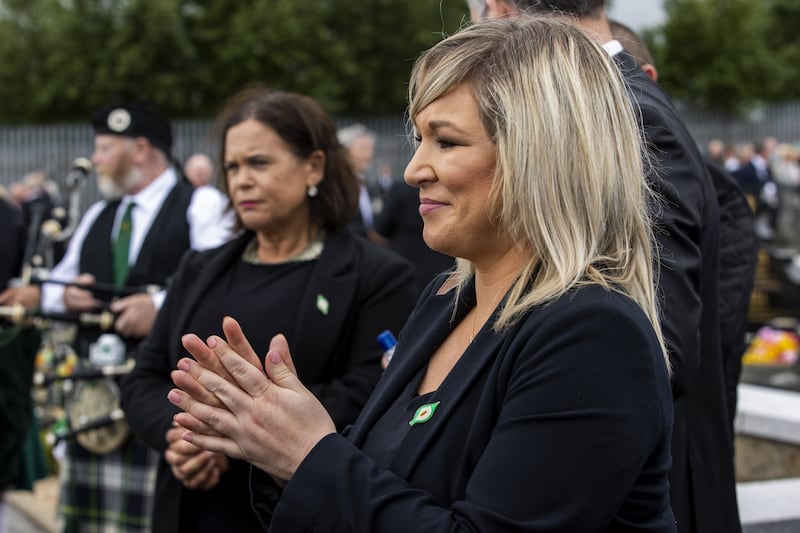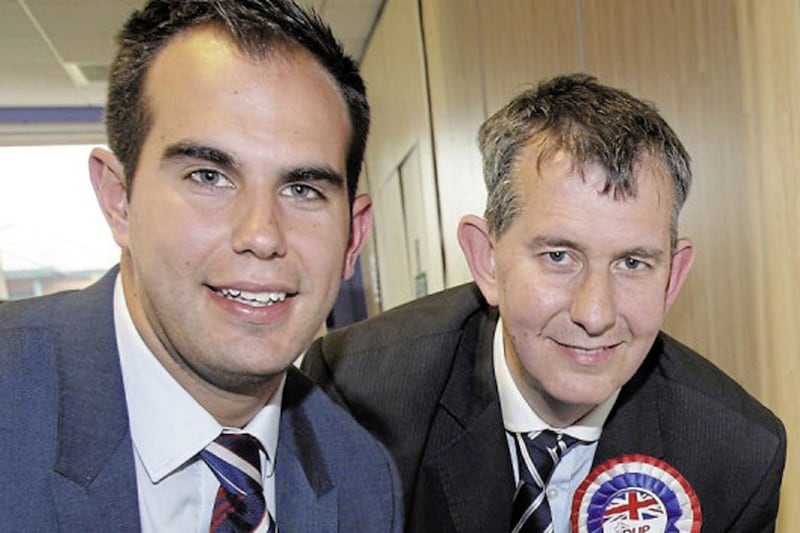Former DUP Minister Edwin Poots unlawfully took a politically motivated decision in ordering a halt to Irish Sea border checks, the High Court has ruled.
Quashing the instruction issued to Department of Agriculture, Environment and Rural Affairs (DAERA) staff, a judge held that Mr Poots breached a legal obligation to implement inspections on goods entering Northern Ireland’s ports.
The step taken in February this year came amid the DUP’s opposition to the Northern Ireland Protocol – a regime put in place to avoid a hard border with the Irish Republic.
Mr Poots, Agriculture Minister at the time, said he had received legal advice that he could direct a halt in the absence of approval for the inspections from the wider Stormont Executive.
But Mr Justice Colton found consent from ministerial colleagues in the power-sharing cabinet was not required.
He said: “It is difficult to draw conclusion other than the decision under challenge was an overtly political one, taken for political reasons, and as part of a political campaign directed in opposition to the Protocol.”
Despite Mr Poots’ instruction, border checks on agri-food products entering Northern Ireland have continued pending the outcome of the judicial review proceedings.
Legal action was taken by a Sinn Féin member granted anonymity, another applicant named Edward Rooney, and Belfast City Council.
They argued that implementation of the checks had been allocated to Mr Poots’ Department, and that his subsequent decision was so significant and controversial that it required Executive consent.
Lawyers for the City Council stressed it was seeking judicial clarity about the “confusion and operational inpossibilities” allegedly caused by the inconsistent actions of a Stormont department.
The increasing workload of carrying out some of the port inspections has led to staff levels rising from four port health officers to 32 employees, the court heard.
Mr Justice Colton was told the European Union (Withdrawal) Act and the Protocol imposed an obligation in domestic law to apply regulations in Northern Ireland separately from Britain.
The international agreement between the EU and the United Kingdom fundamentally alters the nature of the customs relationship, according to the City Council.
A barrister for Mr Poots contended that checks are not legally required because of Northern Ireland’s defined territorial standing within the UK.
He claimed post-Brexit regulations governing import controls place no obligation on the Minister’s officials to carry out inspections.
The court also heard the decision to stop port checks came after Mr Poots was served with a pre-action letter by loyalist activist Jamie Bryson.
In the correspondence Mr Bryson contended that an absence of Executive authority meant the regulations do not require the inspections to be carried out.
Counsel for the unidentified Sinn Féin member described the activist’s intervention as an “ingenious construct” which had led to the current proceedings.
However, Mr Justice Colton held that the Executive Committee had no approval function - despite the Minister seeking to “absolve himself” of legal obligations to carry out the checks by relying on the 1998 Northern Ireland Act.
He pointed out that the instruction had been issued at a time when the then DUP First Minister Paul Givan’s resignation was imminent, and consistent with the party’s previously declared strategy of opposition to the Protocol.
The suggestion that referral of the matter to the Executive was to ensure compliance with the law “sits uneasily” with the assertion that DUP Ministers would use their votes at the Committee to frustrate any additional checks, the judge said.
He stated: “It may well be that for politicians, as the DUP leader said in September 2021 ‘there are no easy answers when the law requires one thing and politics demands something else’.
“From the court’s perspective there is an easy answer and that is that the law must be obeyed.
“Any politically motivated decision that is in accordance with the law is unimpeachable.
“Every such decision which does not satisfy this indelible standard is unsustainable in law and must be set aside as a consequence.”
Formally quashing Mr Poots’ order to staff, Mr Justice Colton confirmed: “By issuing the instruction on February 2, 2022 the Minister was in breach of his legal obligations.
“The instruction was unlawful and of no effect.
Anonymity was granted to the Sinn Féin member who took the challenge amid fears he may be targeted by loyalist paramilitaries.
Outside court his solicitor, Ciaran O’Hare of McIvor Farrell, predicted the ruling will have a wider impact on businesses and governments in the UK and EU.
He said: “My client is delighted with today's verdict, he has been vindicated in his endeavours to date.
“This truly is a ground-breaking judgment that clarifies some of the legal issues surrounding the Northern Ireland Protocol and emphasises the fact that the rule of law must be obeyed by all.”








